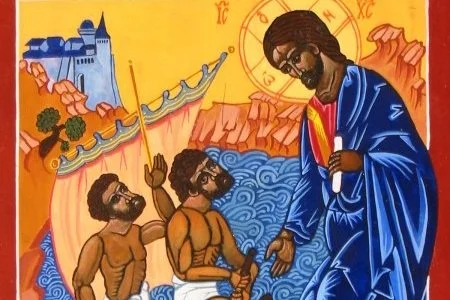The 3rd Sunday after Epiphany
Matthew 4:12-23
Now when Jesus heard that John had been arrested, he withdrew to Galilee. He left Nazareth and made his home in Capernaum by the sea, in the territory of Zebulun and Naphtali, so that what had been spoken through the prophet Isaiah might be fulfilled: “Land of Zebulun, land of Naphtali, on the road by the sea, across the Jordan, Galilee of the Gentiles— the people who sat in darkness have seen a great light, and for those who sat in the region and shadow of death light has dawned.” From that time Jesus began to proclaim, “Repent, for the kingdom of heaven has come near.” As he walked by the Sea of Galilee, he saw two brothers, Simon, who is called Peter, and Andrew his brother, casting a net into the sea—for they were fishermen. And he said to them, “Follow me, and I will make you fish for people.” Immediately they left their nets and followed him. As he went from there, he saw two other brothers, James son of Zebedee and his brother John, in the boat with their father Zebedee, mending their nets, and he called them. Immediately they left the boat and their father, and followed him. Jesus went throughout Galilee, teaching in their synagogues and proclaiming the good news of the kingdom and curing every disease and every sickness among the people.
January 15, 1991 brought its usual cold weather to Washington D.C. Inside the White House, President George H. W. Bush received Billy Graham who came to assure the president on a moral issue. Outside the White House, Bishop Edmund Browning, Presiding Bishop of the Episcopal Church, of which President Bush was a member, joined other protestors calling on the President not to begin the Gulf War. Bishop Browning led a moral campaign against American involvement in the Gulf War and he unsettled President Bush’s moral conscience with his appeal for peace.
Some of us remember the televised bombing of Iraq which may have resembled a child’s on line war game than an actual battle.
The forces of government regularly threaten and are threatened by the forces of faith.
We hear hints of that conflict at the start of today’s Gospel passage: When Jesus heard that John had been arrested, he withdrew to Galilee. (Mt. 4: 12) Galilee and all of Israel was under the control of Roman occupiers. Herod Antipas dominated Galilee and was responsible for the death of John the Baptist. Jesus would read the tea leaves and understand early in his career that his call as Messiah would place him in conflict with the political powers. We shall see that on two occasions Jesus will place himself out of the political limelight and plan his future ministry.
Some of us would consider that the call of the apostles Peter and Andrew, James and John, involve these men in a deep religious response to Jesus as their Rabbi. Jesus exerts considerable power in his call of these first followers.
When you hear the stories of the call of these disciples, do you consider Jesus calling you to be a disciple? Do you hear that call of Jesus inviting you to forsake all and follow him? Every year, when you hear the stories of the call of the first disciples, you are invited to consider your call, to deepen your love for Jesus who summons you, to forsake those burdens which hinder you from a deeper following of Jesus. We respond to Jesus’ call within the context, not of 1st century Galilee but of 21st century United States of America.
When Peter and Andrew, James and John left everything to follow Jesus, they opted for more than just a religious following of a rabbi. They had to forsake and leave behind the established social patterns of their day. These two pairs of brothers were fishermen, local entrepreneurs who engaged with the Roman authorities for permissions to fish the Sea of Galilee for upholding the local economy, for supporting with their taxes the Roman Empire. By forsaking their jobs, they were abandoning the hold the dominant Roman culture exerted on them.
In answering your call as a disciple, you too are invited to examine the places in your heart where the dominant culture of our day compromises your Christian call. You all know that we live in a polarized political world, where the differences in political perspective are not respected but become occasions for hostilities. Do you notice how the climate of conflict in which you live seeps into your heart and lures you into creating not harmony with others but conflict? God invites us Christians be become agents of reconciliation in our world. Reconciliation and discord represent conflicting energies. To enter into that calling you have to see the seeds of discord which are planted in our hearts by our broader culture.
If you look at the first disciples, you will see that saying no to the culture involves a long process of purification. James and John would struggle with their impulsivity and anger during their training time with Jesus. Peter would learn the cost of following Jesus would demand that he surrender not only his temper but his very life.
You too are challenged to identify the ways our culture erodes, so subtly erodes, your call as a Christian so that you work not for the building up of the dominant culture but of God’s reign. Peter and Andrew, James and John could initially see the obvious ways Jesus called them to renounce their connections with the dominant culture. The longer they stayed with Jesus they saw the subtle transformations of their hearts and minds which Jesus required.
You who have chosen to follow Jesus, are invited to that deeper following of Jesus, that more subtle renunciation of the influences of our culture’s value of division. The clearer you see the compromises made to our culture, the surer is your abandonment of those values and the closer you can follow the call of Jesus. May the Spirit, who invites you to a deeper sharing in the life of Jesus, open your eyes and strengthen your heart to hear that subtle voice of Jesus and know the strengthen of Jesus’ love.


